From Classroom to Clinic: Real-World Diet Counselling by Nutrition Students…
Picture this: a nervous third-year student clutching her notepad, approaching a diabetic patient for the first time. Her hands shake slightly as she introduces herself, but within minutes, she’s confidently explaining how timing meals can help stabilize blood sugar. This transformation happened countless times during IIMT University’s recent diet counselling initiative at Lifeline Hospital, where students from the Department of Community Science stepped out of their comfort zones to counsel real patients.
The event wasn’t just another academic exercise – it was a reality check that turned textbook theories into genuine human connections.
When Theory Meets Hospital 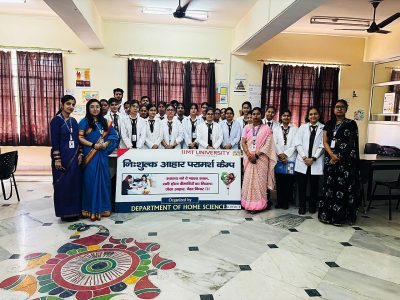 Corridors
Corridors
After months of memorizing food composition tables and studying disease pathology, students from the Department of Community Science finally got their hands dirty with actual patient care. The department offers three flagship programs that prepared these students for this moment:
B.Sc. in Food Science and Dietetics (3-Year Program): This comprehensive undergraduate program combines scientific understanding with practical nutrition applications. Students dive deep into food chemistry, human physiology, and therapeutic nutrition, learning to analyse nutritional content and design meal plans for different age groups.
B.Sc. (Hons.) in Food Science & Dietetics (4-Year Program): This advanced honours’ program provides intensive research-focused training. The additional year allows students to delve deeper into clinical nutrition, food technology innovations, and advanced therapeutic dietetics, including mandatory clinical rotations and research projects.
M.Sc. in Food and Nutrition (2-Year Program): This postgraduate program focuses on advanced research methodologies and specialized areas like nutrigenomics, sports nutrition, and clinical nutrition interventions, preparing graduates for leadership roles in healthcare.
Walking through Lifeline Hospital’s corridors that day, you could sense the nervous energy mixed with excitement. Students who had spent countless hours in well-equipped laboratories were about to discover whether they could actually make a difference in someone’s life.
IIMT University has built quite a reputation in nutrition education, standing alongside institutions recognized as some of the best hotel management colleges in India. While the Delhi campus gains recognition among hotel management colleges in Delhi, the Department of Community Science has carved its own niche through these specialized programs, also offering M. Sc. nutrition and dietetics and M. Sc. Food Science and Dietetics.
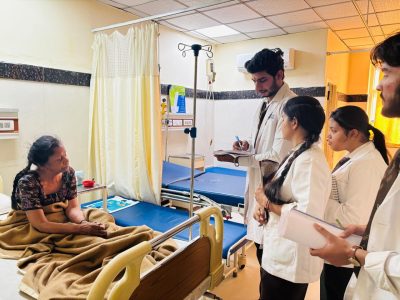
Real People, Real Problems, Real Solutions
The hospital buzzed with activity as students set up consultation stations. Unlike controlled practice sessions, these were actual patients with genuine health challenges. Mrs. Sharma, a 58-year-old diabetic, sat across from Priya, a second-year M.Sc. student, sharing her frustrations about managing her condition.
“I’ve tried everything,” Mrs. Sharma sighed. “But nobody explains it in a way I can understand.”
That’s when the magic happened. Priya didn’t just rattle off a standard diabetic diet plan. Instead, she listened to Mrs. Sharma’s daily routine, food preferences, budget constraints, and even her grandson’s upcoming birthday party.
The students handled an incredible variety of cases:
Diabetes Conversations:
- Teaching patients how to read labels practically
- Showing portion control using everyday items
- Explaining why skipping breakfast made blood sugar worse
- Creating realistic meal plans for busy schedules
Heart Health Discussions:
- Convincing patients that heart-healthy eating didn’t mean giving up flavors
- Introducing simple cooking swaps that actually tasted better
- Teaching families how to cook together for better health outcomes
Digestive Health Support:
- Creating elimination diet plans that didn’t feel like punishment
- Explaining the gut-brain connection in simple terms
- Providing emotional support alongside nutritional guidance
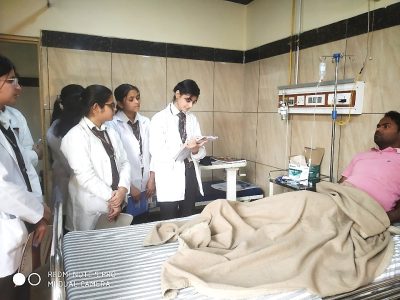
The Learning Curve Nobody Talks About
What struck everyone was how different real patients were from textbook cases. Students quickly realized that perfect nutrition plans mean nothing if patients can’t follow them.
Skills That Developed Naturally:
- Learning to explain complex concepts using simple analogies
- Becoming comfortable with uncomfortable silences
- Reading between the lines of what patients actually meant
- Managing their own emotions when faced with difficult cases
Real-World Reality Checks:
- Recognizing that textbook timeline rarely matched real life
- Understanding that family dynamics affected dietary choices
- Learning to work within budget limitations
- Accepting that progress sometimes meant two steps forward, one back
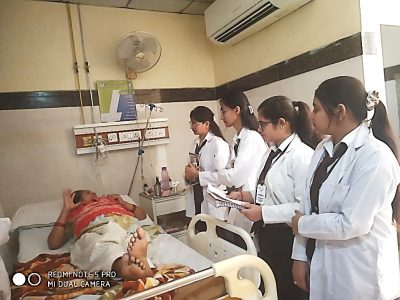
Beyond the Classroom Walls
The initiative highlighted something special about IIMT University’s approach to education. The Department of Community Science stands out with its comprehensive curriculum design across three specialized programs.
Department Excellence:
- B.Sc. students bring strong foundational knowledge in food chemistry and basic nutrition
- B.Sc. (Hons.) students demonstrate advanced research skills and specialized clinical expertise
- M.Sc. students contribute cutting-edge research perspectives and specialized expertise
- State-of-the-art laboratory facilities prepare students for real-world challenges
- Integration with healthcare institutions provides continuous learning opportunities
Student Success Stories:
- Graduates working in leading hospitals across the country
- Alumni who’ve started their own nutrition consulting practices
- Students who discovered their passion for specialized areas like sports nutrition
- Strong placement rates in competitive healthcare positions
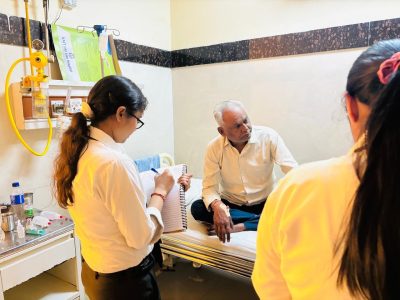
The Ripple Effect
The impact extended far beyond the hospital walls. Patients went home with practical knowledge they could actually use, while families learned alongside primary patients, creating support systems for healthier living.
Patient Transformations:
- Increased confidence in managing chronic conditions
- Better understanding of how food choices affected their health
- Practical skills for grocery shopping and meal preparation
- Sense of empowerment in taking control of their health
Healthcare System Benefits:
- Better patient compliance with dietary recommendations
- Improved collaboration between healthcare disciplines
- Enhanced patient satisfaction with nutritional care
- Stronger relationships between academic institutions and healthcare providers
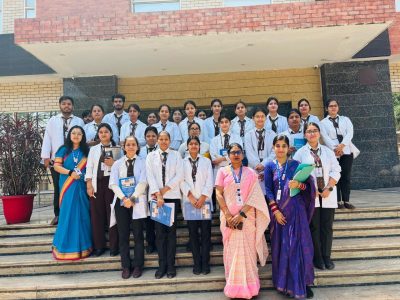
Looking Forward
The success of this initiative has opened doors for expanded collaboration. Plans are underway for regular clinical rotations, community health screenings, and specialized programs for different patient populations.
Students left the hospital fundamentally changed. They had tasted what it meant to be healthcare providers, not just students. The nervous energy from the morning had transformed into quiet confidence and genuine excitement about their future careers.
The Department of Community Science has proven that combining solid academic foundation with genuine practical experience creates professionals who can bridge the gap between scientific knowledge and human need. Through their carefully designed B.Sc. in Food Science and Dietetics, B.Sc. (Hons.) in Food Science & Dietetics, and M.Sc. in Food and Nutrition programs, students develop both scientific rigor and practical skills necessary for effective patient care.
As these students continue their studies, whether in the department’s core programs or exploring additional specializations in M. Sc. nutrition and dietetics and M. Sc. Food Science and Dietetics, they carry with them the understanding that their future work will be about much more than just food – it will be about helping people live healthier, happier lives.
The Human Side of Healthcare
What made this event truly special wasn’t the clinical protocols or perfect meal plans. It was the moment when a student realized they had genuinely helped someone feel better. It was watching patients light up when they understood that managing their condition was possible.
These moments can’t be taught in classrooms or learned from textbooks. They happen when students step out of their academic bubble and into the real world, where their knowledge can make a tangible difference in someone’s life.
The journey from classroom to clinic isn’t just about applying learned concepts – it’s about discovering that healthcare is fundamentally about human connection, understanding, and hope. And that’s exactly what these nutrition students found during their day at Lifeline Hospital.
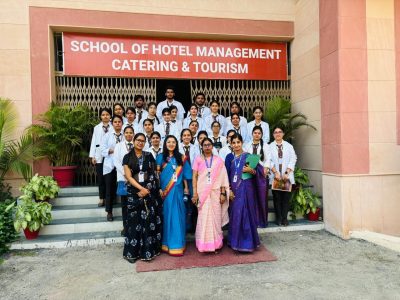
Written By: ARUSHI
Department of Home Science/Community Science, SOHMCT.

